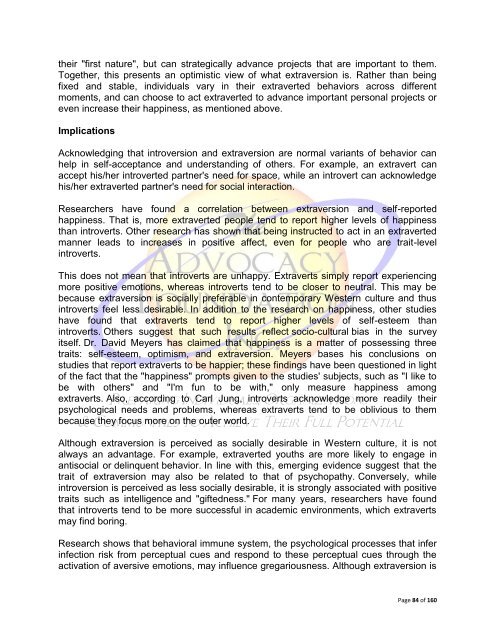The Gift of Introversion
The Gift of Introversion
The Gift of Introversion
You also want an ePaper? Increase the reach of your titles
YUMPU automatically turns print PDFs into web optimized ePapers that Google loves.
their "first nature", but can strategically advance projects that are important to them.<br />
Together, this presents an optimistic view <strong>of</strong> what extraversion is. Rather than being<br />
fixed and stable, individuals vary in their extraverted behaviors across different<br />
moments, and can choose to act extraverted to advance important personal projects or<br />
even increase their happiness, as mentioned above.<br />
Implications<br />
Acknowledging that introversion and extraversion are normal variants <strong>of</strong> behavior can<br />
help in self-acceptance and understanding <strong>of</strong> others. For example, an extravert can<br />
accept his/her introverted partner's need for space, while an introvert can acknowledge<br />
his/her extraverted partner's need for social interaction.<br />
Researchers have found a correlation between extraversion and self-reported<br />
happiness. That is, more extraverted people tend to report higher levels <strong>of</strong> happiness<br />
than introverts. Other research has shown that being instructed to act in an extraverted<br />
manner leads to increases in positive affect, even for people who are trait-level<br />
introverts.<br />
This does not mean that introverts are unhappy. Extraverts simply report experiencing<br />
more positive emotions, whereas introverts tend to be closer to neutral. This may be<br />
because extraversion is socially preferable in contemporary Western culture and thus<br />
introverts feel less desirable. In addition to the research on happiness, other studies<br />
have found that extraverts tend to report higher levels <strong>of</strong> self-esteem than<br />
introverts. Others suggest that such results reflect socio-cultural bias in the survey<br />
itself. Dr. David Meyers has claimed that happiness is a matter <strong>of</strong> possessing three<br />
traits: self-esteem, optimism, and extraversion. Meyers bases his conclusions on<br />
studies that report extraverts to be happier; these findings have been questioned in light<br />
<strong>of</strong> the fact that the "happiness" prompts given to the studies' subjects, such as "I like to<br />
be with others" and "I'm fun to be with," only measure happiness among<br />
extraverts. Also, according to Carl Jung, introverts acknowledge more readily their<br />
psychological needs and problems, whereas extraverts tend to be oblivious to them<br />
because they focus more on the outer world.<br />
Although extraversion is perceived as socially desirable in Western culture, it is not<br />
always an advantage. For example, extraverted youths are more likely to engage in<br />
antisocial or delinquent behavior. In line with this, emerging evidence suggest that the<br />
trait <strong>of</strong> extraversion may also be related to that <strong>of</strong> psychopathy. Conversely, while<br />
introversion is perceived as less socially desirable, it is strongly associated with positive<br />
traits such as intelligence and "giftedness." For many years, researchers have found<br />
that introverts tend to be more successful in academic environments, which extraverts<br />
may find boring.<br />
Research shows that behavioral immune system, the psychological processes that infer<br />
infection risk from perceptual cues and respond to these perceptual cues through the<br />
activation <strong>of</strong> aversive emotions, may influence gregariousness. Although extraversion is<br />
Page 84 <strong>of</strong> 160

















